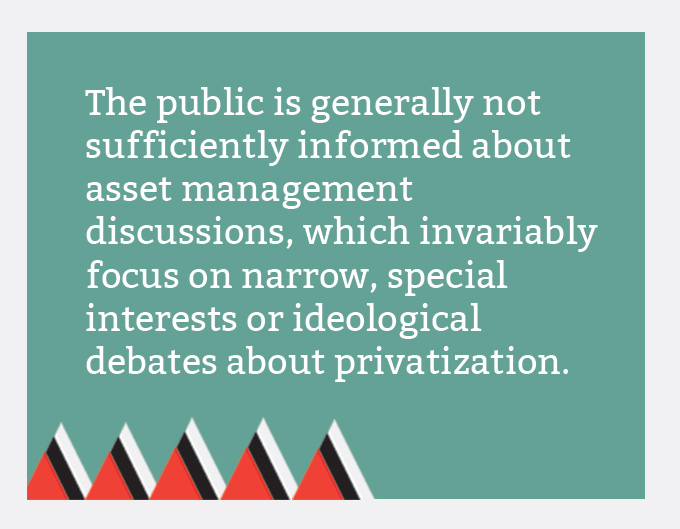March 12, 2015
A report that the Ontario government is considering selling shares of Hydro One caused us to dust off our laptops and look into the distant past of 2013.
We conducted a series of interviews with senior public and private sector executives with extensive experience in the asset management field — whether overseeing public assets, investing in them or advising governments on how to manage them.
Our conversations focused on the key success factors for governments facing challenging decisions about public assets. Some of their observations are below:
1. Ensuring clarity of purpose
What is a government’s objective with a particular asset? A public sector executive put forward two key questions that governments must ask: “is owning, managing or operating an asset important to achieve public policy? What is the structure of public/private money and roles and responsibilities that optimizes the societal utility associated with that asset?”
“What do people look to me to do in exchange for tax revenue?”
The purpose of assets should be considered within a longer-term framework. A private sector executive told us that “the first issue that governments should take into account when dealing with public assets is a long-term vision of what it is that particular asset provides to the people of Ontario.”
2. Is it a core government function?
Our interviewees, whether career private sector executives or long-time public servants, were all of the view that a fundamental question to ask about assets is whether they represent a core government function or not. One private sector executive noted that “it is not always clear whether government has a sufficiently clear view of what its mission is. Government needs to decide: what’s my job, and what do people look to me to do in exchange for tax revenue? If it doesn’t meet that test, then it is non-core.”
A public sector executive framed the challenge as determining whether there is a “legitimate public interest that needs to be protected that requires government ownership or oversight of this asset? Secondly, is the way you deal with that asset the best way to accomplish that end?” These answers can also change over time for different assets — something that may have once been a core government function may not always remain so. A private equity executive succinctly noted “just because a service has been owned by government in the past, doesn’t mean it’s like a tablet from Moses which reads ‘This is the only way things can be done.’”
 3. Structuring deals appropriately
3. Structuring deals appropriately
A number of our interviewees expressed concerns that governments are typically negotiating with far more savvy parties in the realm of infrastructure development and asset divestiture. Infrastructure Ontario has successfully bridged this knowledge gap by recruiting staff with private sector expertise to negotiate and execute infrastructure financing and procurement arrangements, and was highlighted as a best-in-class example by numerous interviewees.
Governments will often retain outside counsel from private sector banks to put together deals in the asset management realm. Private sector investment executives we spoke to had concerns about the nature of advice governments tend to receive in these situations. One noted about a particular proposed deal that “bankers can pick up what the government wants to hear and play it back to them… Fees went to the bankers but they weren’t optimizing the opportunity. It was a suboptimal arrangement.”
Governments often seek to maintain control of an asset but sell off a minority interest to raise revenue — but, our interviewees were clear that this type of arrangement is not as attractive to private sector investors. Several noted that a better approach is to sell off a majority share and ensure that the government retains sufficient interest in a minority stake to realize up-side potential. One of our informants called governments’ stake in this type of situation “schmuck insurance” — not flattering, but a blunt way to acknowledge how best to harness private sector capacity to achieve an objective.
4. Obtaining buy-in
Ensuring key stakeholders and the public are properly informed when it comes to asset-related decisions is necessary to secure adequate buy-in and support for those decisions. Our interviewees were nearly unanimous in agreeing that the public is generally not sufficiently informed about asset management discussions, which invariably focus on narrow, special interests or ideological debates about privatization.
“You can’t start something if you can’t finish it…”
To successfully navigate major asset management decisions, governments should prioritize public debate that focuses on the merits of a particular issue, informed by facts and not fed by fears or emotions. As stated by a former political advisor, “You can’t start something if you can’t finish it — don’t roll it out until it has a reasonable chance of success, and don’t do something if you think someone else is going to take it back when someone else is elected.”
More related to this topic
Author
Sunil Johal
Release Date
Mar 12, 2015






